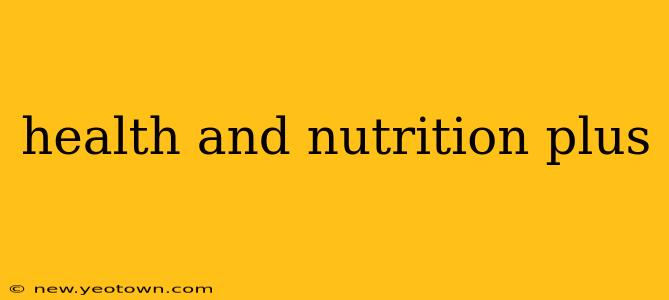Let's embark on a journey together, exploring the fascinating world of health and nutrition. This isn't just about diets and weight loss; it's about feeling truly vibrant, energized, and empowered in your daily life. We'll delve into the science behind wellness, uncover practical strategies, and address common questions to guide you towards a healthier, happier you.
What are the benefits of a healthy diet?
This is a fundamental question, and the answer is multifaceted. A healthy diet is the cornerstone of good health, impacting nearly every aspect of your well-being. Think of it as providing your body with the high-quality fuel it needs to function optimally. The benefits are numerous, and include:
- Increased energy levels: Imagine waking up feeling refreshed and ready to tackle the day, instead of dragging yourself out of bed. A balanced diet provides sustained energy, reducing those mid-afternoon slumps.
- Improved mood and cognitive function: Your brain thrives on proper nutrition. A healthy diet can enhance focus, memory, and overall cognitive performance, leading to improved mood and reduced risk of depression and anxiety.
- Stronger immune system: A well-nourished body is better equipped to fight off illness. Essential nutrients strengthen your immune defenses, making you less susceptible to infections.
- Weight management: While weight loss isn't always the primary goal, a healthy diet supports a healthy weight, reducing the risk of obesity-related diseases.
- Reduced risk of chronic diseases: Heart disease, type 2 diabetes, and certain cancers are all linked to poor diet. By nourishing your body, you significantly lower your risk of these serious health problems.
What are some examples of healthy foods?
The beauty of healthy eating lies in its diversity. There's no one-size-fits-all answer, but focusing on whole, unprocessed foods is key. Imagine filling your plate with a vibrant rainbow of colors:
- Fruits and vegetables: These are packed with vitamins, minerals, and antioxidants. Aim for a variety of colors to maximize nutrient intake.
- Whole grains: Opt for brown rice, quinoa, oats, and whole-wheat bread over refined grains. They provide sustained energy and fiber.
- Lean protein: Include sources like fish, poultry, beans, lentils, and tofu. Protein is essential for building and repairing tissues.
- Healthy fats: Avocado, nuts, seeds, and olive oil provide essential fatty acids that support brain function and overall health.
How can I improve my diet?
Improving your diet is a journey, not a race. Small, sustainable changes are more effective than drastic overhauls. Here are some practical steps:
- Start small: Don't try to change everything at once. Focus on incorporating one or two healthy choices each week.
- Read food labels: Become more aware of what's in your food. Pay attention to serving sizes, calories, and ingredients.
- Cook more often: Preparing your own meals gives you greater control over ingredients and portion sizes.
- Hydrate: Drink plenty of water throughout the day. Water is essential for countless bodily functions.
- Seek professional guidance: A registered dietitian or nutritionist can provide personalized advice tailored to your individual needs.
What are some common nutrition myths?
The world of nutrition is rife with misinformation. Let's debunk some common myths:
- Myth: Skipping meals helps with weight loss. Truth: Skipping meals can actually lead to overeating later in the day and can negatively impact your metabolism and energy levels.
- Myth: All fats are bad. Truth: Healthy fats are essential for good health. Focus on consuming unsaturated fats found in sources like avocados and nuts.
- Myth: Carbohydrates are the enemy. Truth: Complex carbohydrates, like whole grains, are a vital source of energy. It's the refined carbohydrates that you need to limit.
How can I incorporate more physical activity into my daily routine?
A healthy diet works in synergy with regular physical activity. This doesn't necessarily mean hitting the gym every day; it's about finding activities you enjoy and can incorporate into your daily life. Consider:
- Walking: A simple yet effective way to increase activity levels.
- Cycling: A fun and efficient way to commute or explore your surroundings.
- Swimming: A low-impact exercise that's gentle on your joints.
- Yoga or Pilates: Improve flexibility, strength, and balance.
Remember, your journey to optimal health and nutrition is a personal one. Embrace the process, celebrate your successes, and don't be afraid to seek support when needed. A healthy lifestyle is an investment in your future well-being, leading to a more vibrant and fulfilling life.

